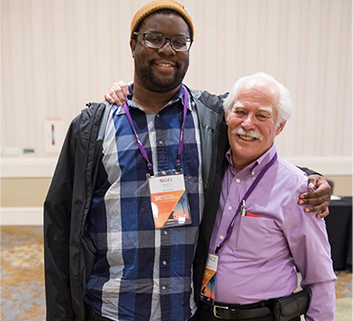Join the National Siblings Council or National Council of Self-Advocates as an Officer!
Start your year with exciting new opportunities for involvement in our work! As an officer on the National Siblings Council and the National Council of Self-Advocates for 2019-2020, you will have an invaluable seat at the table helping shape the work of the National Office throughout the year.
National Council of Self-Advocates
The NCSA was developed to foster the active involvement of individuals with I/DD in the work of The Arc. Its primary purpose is to encourage people with I/DD to provide feedback to The Arc on how its advocacy, programs, and services can better empower people with to live the life they want to live in the community. Members of the NCSA provide regular feedback on work that The Arc national office is doing and provide guidance about important issues that matter to people with disabilities in community around the nation. NCSA members also seek to promote education around advocacy issues that are critical to people in the disability movement through our annual convention session, and they seek to be active members and leaders in The Arc’s Disability Advocacy Network and the larger disability movement.
Being an NCSA Officer has several rules and responsibilities, including:
- Officers must attend the 4 Officer meetings each year. These often happen in March, May, August, and November.
- Officers must attend the 4 All-Council meetings each year. These often happen in March, June, September, and December.
- Officers must help plan The Arc’s self-advocate convention session.
- Officers must be willing to help make big decisions about what the Council should do in the future.
- Officers must help think of steps to take to achieve the goals that the NCSA wants to achieve.
- Officers must help take action to carry out these goals.
- Officers must help encourage people to join the Council and give feedback.
- Officers must share what the Council is doing with others.
- Officers must give feedback to The Arc on how to improve its work.
Apply to be an officer of NCSA.
Deadline: February 15
National Siblings Council
Are you a sibling looking to get more involved in disability rights activism but are not sure where to turn? The Arc’s National Sibling Council seeks to foster the active involvement of siblings of individuals with I/DD in The Arc movement in order to strengthen and grow The Arc’s grassroots advocacy efforts nationwide and formally connect siblings—an important and unique segment of the disability rights movement—to help promote and protect the rights of individuals with I/DD throughout the country. The Arc seeks applications from those who are eager to take a leadership role in learning more about how to engage in disability rights activism as a new mode of providing support to their siblings and the broader disability community.
Officers participate in four quarterly conference calls each year, carry out advocacy action steps assigned in each call, and encourage other siblings to join our movement.
Apply to be an officer of the Sibling Council.












